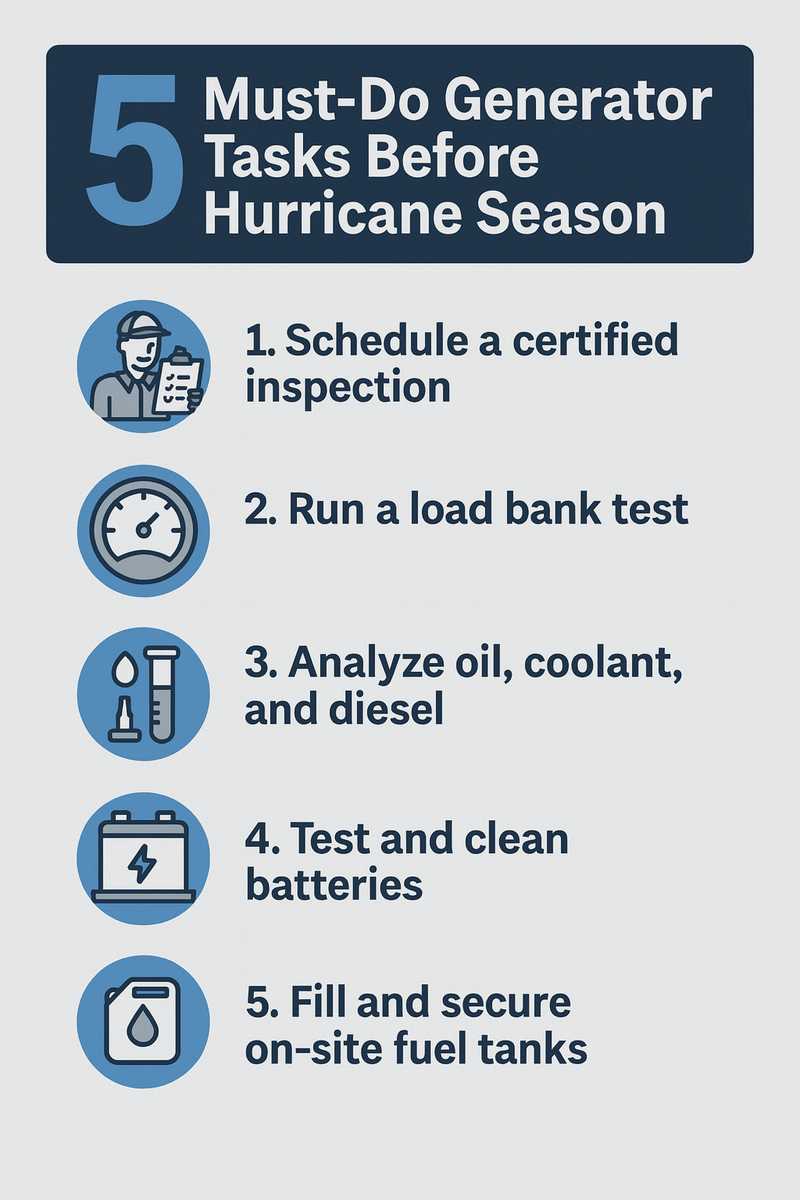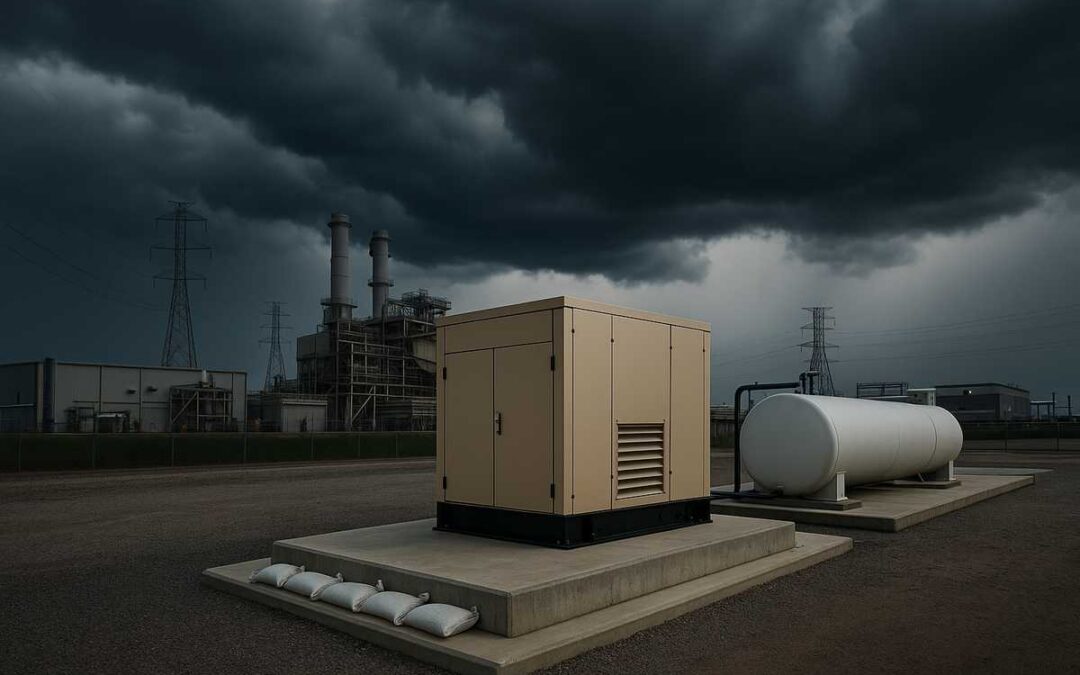Why 2025 Requires More Than Basic Preparedness
The 2025 Atlantic hurricane season is shaping up to be one of the most active in recent years. According to the National Oceanic and Atmospheric Administration (NOAA), there is a 60% likelihood of above-normal storm activity, with forecasts predicting 13 to 19 named storms, six to nine hurricanes, and three to five major hurricanes of Category 3 or higher.
For industries along the Gulf Coast—spanning Texas, Louisiana, Mississippi, Alabama, and Florida—the risks are clear. Hurricanes bring power outages, fuel shortages, flooding, and infrastructure damage. For commercial and industrial businesses, losing power is not just an inconvenience. It halts operations, disrupts supply chains, damages assets, and jeopardizes employee safety.
A reliable generator strategy is the cornerstone of business continuity during hurricane season. This guide will outline the most important steps Gulf Coast industries must take before, during, and after storms to ensure their commercial and industrial generators deliver when needed most.
Why Gulf Coast Industries Face Higher Risks in 2025
NOAA’s forecast highlights a storm season fueled by warmer ocean temperatures and neutral El Niño-Southern Oscillation (ENSO) conditions. These factors create a breeding ground for more frequent and intense hurricanes.
The Gulf Coast is especially vulnerable due to its:
-
Energy infrastructure: Refineries, petrochemical plants, and offshore drilling platforms depend on uninterrupted power.
-
Healthcare facilities: Hospitals and clinics require reliable backup power to protect patients and life-saving equipment.
-
Manufacturing and logistics hubs: Ports, warehouses, and factories cannot afford downtime without risking millions in losses.
The 2024 season offered a harsh reminder. Hurricane Helene devastated parts of North Carolina and Georgia, dropping nearly 30 inches of rain and cutting power for weeks. For Gulf Coast businesses, the lesson is clear: preparation is no longer optional.
Pre-Season Generator Preparations
1. Conduct a Certified Generator Inspection
A pre-season inspection by a certified technician ensures your generator is ready to handle extended outages. This assessment identifies wear, damage, or early warning signs that could cause catastrophic failure during a storm.
2. Perform Load Bank Testing
A load bank test validates the generator’s ability to operate at full rated capacity for an extended period. Without it, facilities risk wet stacking—unburned fuel buildup that reduces efficiency and damages diesel engines.
3. Analyze Fluids and Fuel Quality
-
Oil and coolant analysis detect contamination or early engine wear.
-
Diesel fuel testing ensures there is no water intrusion or microbial growth, which can clog filters and stop operations mid-crisis.
-
Fuel polishing and stabilizers extend diesel quality for long-term storage.
4. Test and Replace Batteries
Dead or corroded batteries are the leading cause of generator startup failure. Conduct voltage tests, clean connections, and proactively replace batteries every 2–3 years.
5. Secure Your Fuel Supply
Fuel shortages are common after hurricanes, when roads may be closed and demand spikes.
-
Fill and anchor tanks on secure concrete pads to withstand storm surge.
-
Secure priority contracts with trusted suppliers for guaranteed deliveries.
-
Maintain extra emergency fuel in approved containers stored in ventilated, dry spaces.
Final Steps as a Hurricane Approaches
When a storm is forecasted within days, it is time to harden equipment and finalize readiness.
1. Harden Your Generator and Systems
-
Place units on elevated concrete pads to avoid flooding.
-
Verify generator housings are sealed against water intrusion.
-
Invest in Miami-Dade compliant enclosures designed for hurricane-force winds.
-
Elevate transfer switches, wiring, and fuel lines above potential flood levels.
2. Anchor and Secure Tanks
Above-ground tanks must be strapped and filled to capacity—either with fuel or water—to prevent shifting during high winds.
3. Manage Loads by Powering Down Non-Essentials
Before the grid goes down, shut off non-critical systems to reduce startup strain on the generator. This ensures smoother transitions and prioritizes life safety and essential functions.
4. Establish an Emergency Fueling Plan
Assign personnel responsible for refueling with strict safety protocols. Always shut down and cool the generator before handling fuel to prevent fire hazards.
Safe Generator Operation During and After the Storm
1. Operate in Safe Conditions
-
Place generators outdoors, dry, and 20–30 feet from any building.
-
Use proper ventilation to prevent carbon monoxide buildup.
-
Install CO detectors inside buildings for employee safety.
2. Follow Employee Safety Protocols
-
Require PPE for all refueling and electrical tasks.
-
Train teams on recognizing downed power lines and gas leaks.
-
Limit access to fuel handling to trained personnel only.
3. Post-Storm Inspections Before Extended Use
-
Conduct a complete inspection before running generators for long durations.
-
Look for water intrusion, wiring damage, or fuel contamination.
-
Repair issues immediately before restarting operations.

Industry Example: Gulf Coast Leaders Setting the Standard
Large-scale energy providers are raising the bar for storm preparedness. In May 2025, CenterPoint Energy held a full-scale hurricane response exercise in Houston, coordinating with state and local officials, emergency managers, and technology partners.
This drill tested every aspect of storm readiness—electric and gas operations, communications, fuel logistics, and equipment resilience. CenterPoint is also investing in AI-driven weather forecasting, Miami-Dade-rated enclosures, and backup generators for critical facilities.
Their actions reinforce an important message: commercial generator readiness is part of broader community resilience. Businesses that prepare are not only protecting themselves but also helping stabilize the local economy after storms.
Beyond Power: A Holistic Continuity Plan
While generators are critical, they are part of a larger continuity strategy. Gulf Coast businesses should:
-
Conduct risk assessments to identify vulnerabilities in supply chains and facilities.
-
Maintain emergency communication protocols for staff and partners.
-
Back up critical data to secure, remote systems.
-
Review insurance coverage, including flood protection, which is often excluded from standard policies.
-
Collaborate with local emergency offices to align response efforts.
Prepared businesses recover faster and gain a reputation for reliability. Those that fail to prepare risk prolonged shutdowns, revenue losses, and long-term brand damage.
Why Partner with React Power Solutions
At React Power Solutions, we specialize in commercial and industrial generator systems that keep Gulf Coast industries operational through the harshest storms.
Our capabilities include:
-
Generator sales and rentals: From 20kW to multi-megawatt units.
-
Certified inspections and maintenance: Prevent costly failures with proactive service.
-
Load bank testing: Validate generator readiness under real-world conditions.
-
Fuel supply support: Guidance on contracts, tank anchoring, and polishing services.
-
Turnkey solutions: Nationwide reach, with a strong focus on Gulf Coast hurricane readiness.
We work with industries that cannot afford downtime, including:
-
Oil and gas
-
Healthcare facilities
-
Manufacturing plants
-
Logistics hubs and data centers
Our team combines decades of experience with advanced solutions to ensure your generators start when you need them most.
The Time to Act Is Now
The Gulf Coast faces another active hurricane season. NOAA’s forecast makes one fact clear: power outages are not a question of if, but when. Businesses that invest in generator readiness today will be the ones protecting employees, safeguarding assets, and serving customers when the grid goes dark.
At React Power Solutions, we help industries transform diesel generators from backup equipment into strategic assets. With inspections, testing, fuel strategies, and storm hardening, your facility can withstand the unpredictable 2025 season.
Contact React Power Solutions today to schedule your Pre-Hurricane Generator Readiness Assessment. Ensure your business stays powered, protected, and prepared—no matter what this season brings.






